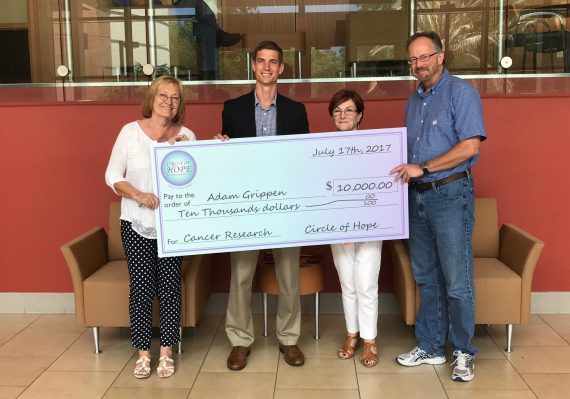Congratulations to BME Ph.D. student Adam Grippin who was recently awarded a $10,000 Circle of Hope for Cancer Research Inc. grant for his research in the area of brain tumor immunotherapy.
Circle of Hope for Cancer Research Inc. is a local nonprofit that spreads awareness throughout the Central Florida area about cancer research; one hundred percent of the funds raised go directly to cancer research. The money raised will be awarded each year to the most promising cancer research project, regardless of which type of cancer it addresses.
Adam’s research focuses on developing personalized therapies that harness the power of the immune system to eliminate cancer. Brain tumors are the leading cause of cancer-related death in children and one of the most aggressive cancers found in adults. The UF Brain Tumor Immunotherapy Program is investigating a new therapy that trains a patient’s own immune cells to eliminate tumors.
Dr. Duane Mitchell, co-director of the Preston A. Wells Jr. Center for Brain Tumor Therapy and director of the UF Brain Tumor Immunotherapy Program, recently showed that these dendritic cell vaccines improve overall and progression free survival in patients with glioblastoma, the most common and most aggressive form of primary brain tumors in adults. Surprisingly, Dr. Mitchell also found that survival benefit can be predicted just 48 hours after initiation of treatment by tracking the migration of each patient’s dendritic cells to their lymph nodes, providing clinicians a powerful tool to predict patient response to this exciting new therapy. However, methods used to measure this response are not widely available.
Adam is working with Dr. Mitchell and Dr. Jon Dobson, professor in the J. Crayton Pruitt Family Department of Biomedical Engineering, to develop nanoparticles that enhance dendritic cell migration to lymph nodes and allow measurement of dendritic cell migration with MRI. The ability to track these cells with a widely accessible modality will allow physicians to understand the factors governing patient response to therapy and personalize treatment strategies for individual patients.
This project will produce a powerful clinical tool to enhance and track patient response to this promising therapy. Adam’s goal is to generate the preclinical data necessary to apply for an Investigational New Drug application for inclusion in Dr. Mitchell’s ongoing Phase II clinical trial.
“My career goal is to draw on all components of my education and establish a translational lab that applies engineering solutions to improve cancer immunotherapy,” said Adam. “With support from the Circle of Hope Research grant I will begin by bridging engineering research and clinical medicine to develop a new method to efficiently activate, select, and track cells for immunotherapy to treat brain tumors.”
